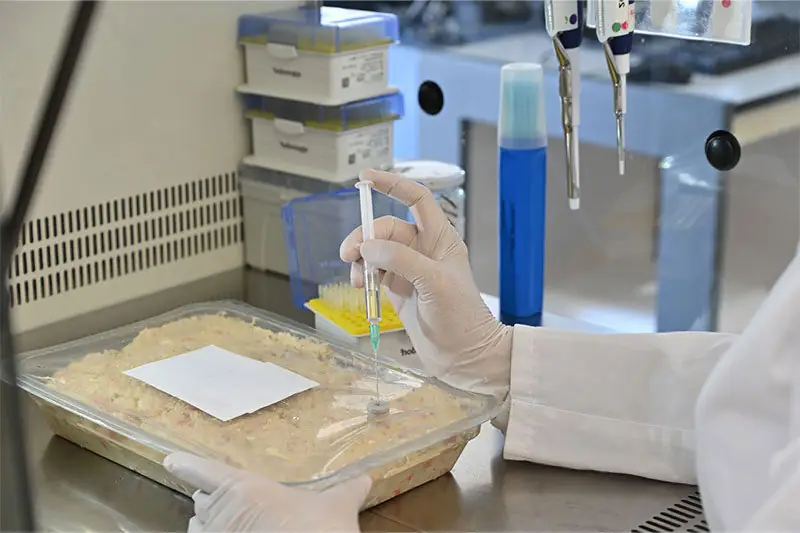Microbial Limit Testing for Cosmetic Raw Ingredients
The microbial limit testing (MLT) is a critical component of quality assurance in the cosmetics industry. This process ensures that cosmetic raw ingredients are free from harmful microorganisms such as bacteria, fungi, and yeasts, which could pose risks to consumers. Given the intimate contact between these products and human skin, it's paramount to maintain stringent hygiene standards during formulation and production.
The testing process involves several stages, including sample collection, preparation, inoculation into appropriate media, incubation, and enumeration of colonies. This method allows for a precise quantification of viable microorganisms present in the cosmetic ingredients. The results are then compared against regulatory limits set by authorities such as the European Union (EU) Cosmetics Regulation, ensuring compliance with international safety standards.
The importance of MLT cannot be overstated; it plays a vital role in protecting public health and maintaining consumer trust. By implementing this testing protocol rigorously, manufacturers can safeguard their reputation and ensure product safety throughout the supply chain. Furthermore, adherence to these stringent measures helps prevent contamination incidents that could lead to recalls or legal issues.
Accurate documentation of each step is essential for traceability purposes. This includes maintaining records of sampling methods, culture media used, incubation conditions, and final colony counts. Such details are necessary not only for internal quality control but also for regulatory audits conducted by health authorities worldwide.
The global landscape of cosmetic regulations continues to evolve, with countries like the EU adopting increasingly stringent requirements regarding microbial limits in personal care products. As a result, ensuring compliance through effective MLT has become more critical than ever before. Companies must stay updated on these changes and adapt their testing procedures accordingly to meet evolving standards.
At Eurolab, our expertise lies in providing comprehensive microbiological safety assessments tailored specifically for cosmetic raw ingredients. Our team of professionals uses advanced laboratory equipment combined with standardized techniques recommended by international bodies such as ISO 11731:2016 and FDA guidelines.
Eurolab Advantages
- Comprehensive Expertise: Eurolab's team comprises seasoned microbiologists with years of experience in cosmetic product development.
- State-of-the-Art Facilities: Equipped with top-tier laboratory instruments that ensure accurate and reliable results every time.
- Rigorous Quality Control: We employ strict quality assurance protocols to maintain consistency across all tests performed.
- Regulatory Compliance: Our services align perfectly with current EU regulations, ensuring your products meet all necessary requirements.
Partnering with Eurolab guarantees you receive unparalleled service backed by years of industry knowledge and cutting-edge technology. Rest assured that when working alongside us, you're investing in a partner committed to excellence and reliability.
International Acceptance and Recognition
- The results from Eurolab's microbial limit testing are widely accepted across numerous regulatory bodies including the EU Cosmetics Regulation, FDA, and other global standards.
- Absolutely crucial for international trade, these certifications provide peace of mind knowing your products adhere to strict hygiene protocols.
Our commitment to quality ensures that our clients' products not only comply with local laws but also resonate favorably in foreign markets. By leveraging Eurolab's expertise, you can rest assured that your cosmetic raw ingredients are safe and suitable for worldwide distribution.
Use Cases and Application Examples
| Product Type | Tested Ingredients | Testing Methodology |
|---|---|---|
| Cleansers | Powders, solvents, surfactants | Solid and liquid media testing with appropriate dilutions |
| Lotions and Creams | Oils, emulsifiers, preservatives | Aseptic sampling followed by incubation in defined media |
| Shampoos and Conditioners | Polyols, polymers, fragrances | Direct plating onto selective agar plates |
- Cleanser formulations often incorporate various powders which need to be tested for potential microbial contamination.
- Lotions and creams contain oils that require careful handling during sampling to avoid introducing contaminants.
- Shampoos may include fragrances that can influence the growth of certain microorganisms, necessitating specialized testing methods.
These examples highlight just a few scenarios where microbial limit testing is essential. Regardless of the specific cosmetic product being developed or produced, ensuring rigorous MLT remains non-negotiable for maintaining high standards of hygiene and safety.





